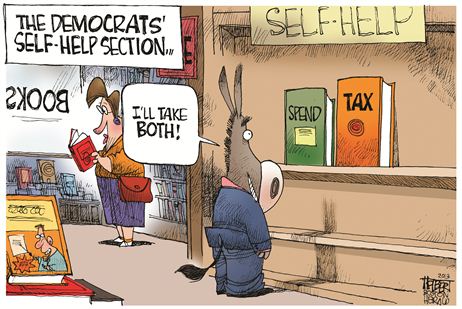October 14, 2020 by Dan Mitchell @ International Liberty
Bernie Sanders was considered a hard-core leftist because his platform was based on higher taxes and higher spending.

Elizabeth Warren also was considered a hard-core leftist because she advocated a similar agenda of higher taxes and higher spending.
And Joe Biden, even though he is considered to be a moderate, is currently running on a platform of higher taxes and higher spending.
Want to know who else is climbing on the economically suicidal bandwagon of higher taxes and higher spending? You probably won’t be surprised to learn that the pro-tax International Monetary Fund just published its World Economic Outlook and parts of it read like the Democratic Party’s platform.
Here are some of the ways the IMF wants to expand the burden of government spending.
Investments in health, education, and high-return infrastructure projects that also help move the economy to lower carbon dependence… Moreover, safeguarding critical social spending can ensure that the most vulnerable are protected while also supporting near-term activity, given that the outlays will go to groups with a higher propensity to spend their disposable income… Some fiscal resources…should be redeployed to public investment—including in renewable energy, improving the efficiency of power transmission, and retrofitting buildings to reduce their carbon footprint. …social spending should be expanded to protect the most vulnerable where gaps exist in the safety net. In those cases, authorities could enhance paid family and sick leave, expand eligibility for unemployment insurance, and strengthen health care benefit coverage…social spending measures…strengthening social assistance (for example, conditional cash transfers, food stamps and in-kind nutrition, medical payments for low-income households), expanding social insurance (relaxing eligibility criteria for unemployment insurance…), and investments in retraining and reskilling programs.
And here’s a partial list of the various class-warfare taxes that the IMF is promoting.
Although adopting new revenue measures during the crisis will be difficult, governments may need to consider raising progressive taxes on more affluent individuals and those relatively less affected by the crisis (including increasing tax rates on higher income brackets, high-end property, capital gains, and wealth) as well as changes to corporate taxation that ensure firms pay taxes commensurate with profitability. …Efforts to expand the tax base can include reducing corporate tax breaks, applying tighter caps on personal income tax deductions, instituting value-added taxes.
Oh, by the way, if nations have any rules that protect the interests of taxpayers, the IMF wants “temporary” suspensions.
Where fiscal rules may constrain action, their temporary suspension would be warranted
Needless to say, any time politicians have a chance to expand their power, temporary becomes permanent.
When I discuss IMF malfeasance in my speeches, I’m frequently asked why the bureaucrats propose policies that don’t work – especially when the organization’s supposed purpose is to promote growth and stability.

The answer is “public choice.” Top IMF officials are selected by politicians and are given very generous salaries, and they know that the best way to stay on the gravy train is to support policies that will please those politicians.
And because their lavish salaries are tax free, they have an extra incentive to curry favor with politicians.
P.S. I wish there was a reporter smart enough and brave enough to ask the head of the IMF to identify a single nation – at any point in history – that became rich by expanding the size and cost of government.
P.P.S. There are plenty of good economists who work for the IMF and they often write papers pointing out the economic benefits of lower taxes and smaller government (and spending caps as well!). But the senior people at the bureaucracy (the ones selected by politicians) make all the important decisions.
No comments:
Post a Comment